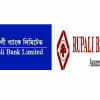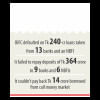Now BIFC faces liquidity crunch
After Farmers Bank, a non-bank financial institution has failed to pay a depositor's money, a development that erodes depositors' confidence.
Bangladesh Industrial Finance Company (BIFC) failed to pay back Tk 31.73 crore of state-owned Rupali Bank due to its liquidity crunch.
Rupali Bank lodged a complaint with the Bangladesh Bank on November 22 where it said the BIFC did not pay back the money, which was a term deposit and had matured in October.
According to Rupali Bank, the bank had deposited Tk 50 crore, of which Tk 30 crore matured last month. The bank sent a number of letters to the trouble-hit BIFC for the Tk 31.73 crore, with interest, but failed to make the BIFC pay.
The BIFC even did not respond to Rupali Bank's queries, a letter mentioned.
Md Ataur Rahman Prodhan, managing director of Rupali Bank, told The Daily Star yesterday, “We have lodged a complaint with the central bank to help us recover the fund. We are also thinking of legal action against BIFC.”
Asked why the BIFC failed to pay, Managing Director MM Mostafa Bilal of the BIFC refused to comment.
The BIFC has been in trouble recently after it had failed to repay Tk 200 crore loans taken from 14 banks. It has asked the Bangladesh Bank for a bailout.
“If the central bank does not provide the fund immediately, we will have to go for liquidation,” said the BIFC in a letter to the Bangladesh Bank in July.
The central bank has barred the company from lending money and receiving deposits.
A Bangladesh Bank official told The Daily Star yesterday that such incidents create risks in the banking sector.
“Banks and NBFIs are the safest place to keep money and if these institutions fail to pay liabilities on maturity, depositors' confidence will erode,” said the official requesting not to be named.
Earlier this month, The Farmers Bank Ltd had twice failed to honour a cheque of Bangladesh Telecommunications Company Ltd worth Tk 35.44 crore because of fund shortages.
The state-run telecom company eventually got its money.
According to the Bangladesh Bank, the BIFC has been incurring a loss of Tk 6.40 crore every month and could not maintain the required Statutory Liquidity Ratio and Cash Reserve Ratio. It has been facing penalties from the central bank continuously, according to a central bank report.
The company saw its default loans spiral in the last five years, from 12.21 percent in December 2012 to 90 percent in December 2016. The BIFC's total default loans stood at Tk 780 crore at the end of last year. It was Tk 84.28 crore at the end of 2012.
At the end of last year, its total deposits stood at Tk 508.62 crore, down 13.25 percent from that of the year before. Its loan portfolio shrunk to Tk 876 crore at the end of last year from Tk 1,063 crore of the previous year.
The BIFC submitted to the central plan a recovery plan containing three options. One of them involves taking Tk 500 crore from the Bangladesh Bank to pay off its bank loans.
Another is to inject fresh equity by raising the paid-up capital. The third option is to prevent the banks from realising loan repayments and rescheduling of the payments with a year's grace period.

 For all latest news, follow The Daily Star's Google News channel.
For all latest news, follow The Daily Star's Google News channel. 








Comments